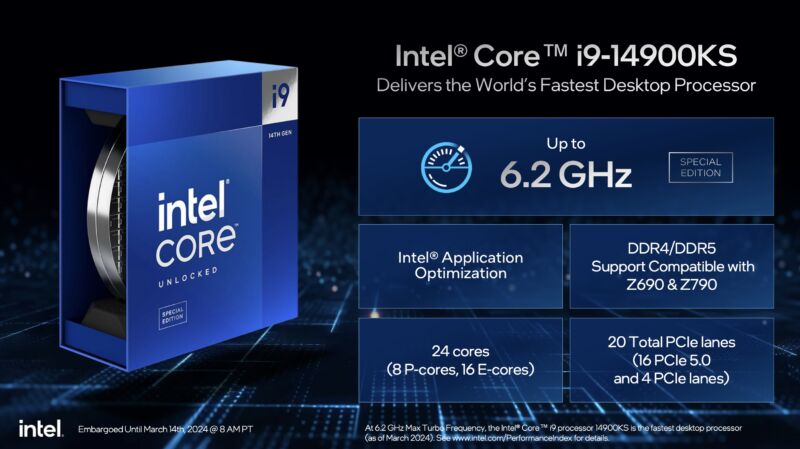Earlier this month, we wrote that some of Intel's recent high-end Core i9 and Core i7 processors had been crashing and exhibiting other weird issues in some games and that Intel was investigating the cause.
An Intel statement obtained by Igor's Lab suggests that Intel's investigation is wrapping up, and the company is pointing squarely in the direction of enthusiast motherboard makers that are turning up power limits and disabling safeguards to try to wring a little more performance out of the processors.
"While the root cause has not yet been identified, Intel has observed the majority of reports of this issue are from users with unlocked/overclock capable motherboards," the statement reads. "Intel has observed 600/700 Series chipset boards often set BIOS defaults to disable thermal and power delivery safeguards designed to limit processor exposure to sustained periods of high voltage and frequency."
These are the specific settings that Intel believes are causing problems:
- Disabling Current Excursion Protection (CEP)
- Enabling the IccMax Unlimited bit
- Disabling Thermal Velocity Boost (TVB) and/or Enhanced Thermal Velocity Boost (eTVB)
- Additional settings which may increase the risk of system instability:
- Disabling C-states
- Using Windows Ultimate Performance mode
- Increasing PL1 and PL2 beyond Intel recommended limits.
Intel's statement recommends that motherboard makers release BIOS updates that use Intel's recommended defaults for these settings. The company is planning to release a public statement about its investigation—along with specific recommended BIOS settings—sometime in May 2024.
As we reported previously, the problems primarily affect high-end unlocked Core i9 CPUs like the i9-13900K and i9-14900K, as well as KF and KS variants of the same processors. Some reports suggest that the i7-13700K and i7-14700K have also been having issues.
These chips are faster variants of Intel's 12th-generation Alder Lake processors with more cores and faster clock speeds, all built on the same Intel 7 manufacturing process. Intel releases these K-series chips to satisfy overclockers and tinkerers, but it's clear that there just isn't a lot of performance headroom left in these chips since Intel is already pushing their clock speeds and voltages to squeeze out generational performance improvements.
We've asked Intel to confirm whether the statement obtained by Igor's Lab is genuine. If it is, we should know more about the company's recommendations for safe power settings sometime next month, and we'll hopefully see new BIOS releases from the motherboard manufacturers that reinstate some of Intel's safeguards for these high-end chips.



3175x175(CURRENT).thumb.jpg.b05acc060982b36f5891ba728e6d953c.jpg)
Recommended Comments
Join the conversation
You can post now and register later. If you have an account, sign in now to post with your account.
Note: Your post will require moderator approval before it will be visible.